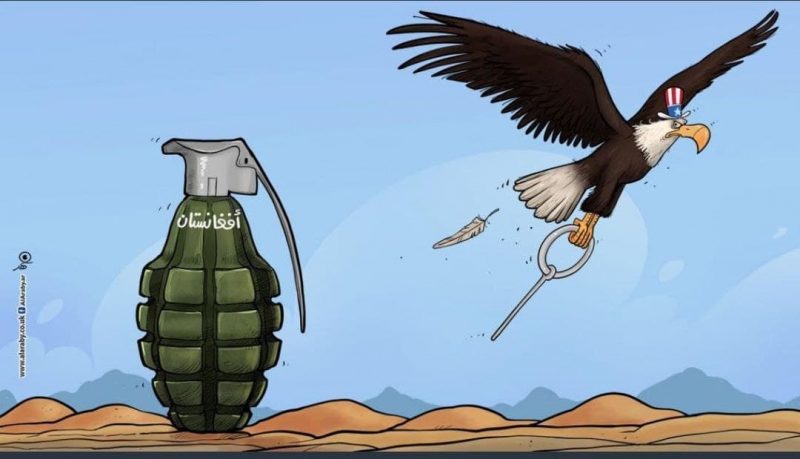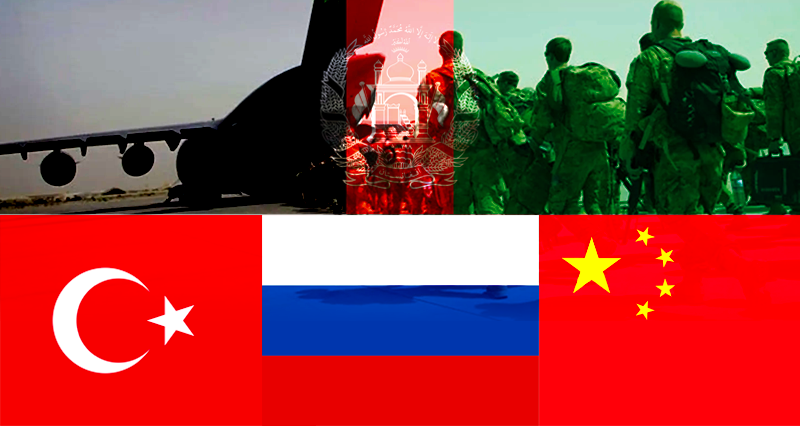The 2001 US invasion of Afghanistan was the initial phase of a project which American neocons called the Greater Middle East Project, aimed at partitioning an entire region spanning from West Asia, North Africa and Central Asia.
Twenty years later from that day, Taliban militia are entering Kabul on one side, and American diplomats are rushing to evacuate the embassy complex as they destroy all classified documents on the other side.
The American withdrawal and the power vacuum
During this unclear and ongoing process, we can come to two complimentary conclusions;
1. It is now a globally known fact that the American empire is in a state of political, economic and military collapse. The United States, which is struggling to overcome its economic and social problems inside, is far from maintaining its claim to be the sole superpower to the outside world.
The United States totally lacks the capacity and ability to fight wars on multiple fronts. The American political elite is already well-aware of the reality of the multipolar world order, and is now trying to come up with politics in accordance with this reality.
When we inspect this new roadmap, in context of Afghanistan;
We can see that Afghanistan’s neighbors Iran and China have taken a stance heavily opposed to the United States for many years.
On the other hand, it is also a well-known fact that Turkmenistan, Uzbekistan and Tajikistan are politically quite distant from the United States and are instead politically closer to Russia.
The latest developments also show that Pakistan has slightly distanced itself from the Atlantic alliance and is now pursuing a balance of power politics between the United States and China. Pakistani officials announce one by one that they do not want an American military base on their territory.
The European members of the Atlantic Alliance are also shifting towards policies that are not as compatible with the United States’ as they used to be previously.
In short, when we evaluate all of these points together, we find that the Americans whose political and military logistical lines have been cut off, prefer to withdraw from Afghanistan and avoid the risk of an even heavier defeat.
This reality, of course, does not mean that the American interest in Afghanistan, the heartland of Central Asia, is completely over.
2. The United States wants to totally prevent the deployment of its rivals’ forces (China, Russia, Iran, etc.) to the region it is withdrawing from. Therefore, it is now typing to implement an “irresponsible withdrawal”, as a Pakistani diplomatic source I interviewed put it, right before the Taliban’s entry into Kabul.

As the United States withdraws its troops, it will also aim to leave behind a loose region that could lead to political or military instability. The US strategy is to intentionally leave a “power vacuum” or a “black hole”.
The US military is scorching the earth behind it as it flees, similar to what the Nazi armies did when retreating back in World War II.
Today’s means of scorching the earth are; stirring up the ethnic and sectarian tensions and scattering the natural demographic structures of the region via uncontrolled refugee waves. This way, a political, military, economic and social vacuum/black hole is being created in this hollowed-out region, swallowing anything and creating constant instability.
In short, the American idea is: “we had to withdraw, but let us create such a chaos that will not either allow our rivals to establish comfortable relationships in Afghanistan”.
Now, the question lies in front of the world and especially in front of all the Asian countries, “What is the future of Afghanistan?”.
What will Asia’s policy on Afghanistan be?
The present day is characterized by multipolarity; new international approaches, alliances and mechanisms are a natural consequence of this multipolarity. We can point to examples such as Shanghai Cooperation Organization, BRICS, Astana Platform etc.
The main concern for the countries in the region, from Turkey to China and Russia, is to develop a common strategy against the US strategy of destabilizing the region through Afghanistan.
Afghanistan can also be described as one of the test grounds for the rising new world after Syria.
If the mistakes at the beginning of the Syrian crisis are repeated here as well, it seems likely that Afghanistan will become nothing but a complete loss for countries in the region.
It is very clear that if the Asian/Eurasian countries take a narrow-sighted, interest-oriented and greedy approach based on ethnic and sectarian tensions like what the West did, the fire will grow even larger in solving the Afghan crisis. However, an approach based on the principles of finding win-win solutions and a mutual respect for the internal affairs, can bring peace, stability and prosperity to the entire region.
The approach of equality towards the Taliban, by China, Russia, Turkey, Iran and Pakistan is quite noteworthy in this context. The calls to leave the Afghan internal affairs to the Afghan people themselves is also very important at the same point.
The following questions will come up quite frequently in the coming period when it comes to Afghanistan;
1. Will the Taliban adopt a strategy similar to the government of national accord, which will embrace different political movements in Afghanistan?
2. Will the Taliban engage in jihadist activities, which will threaten the borders of the neighboring countries?
3. Which policies will the Taliban pursue towards women and towards different ethnic/sectarian groups within the country?
3. What is the Taliban’s view towards the Belt and Road initiative?
4. Will the countries in the region ever be able to develop a joint strategy against the risk of a refugee crisis stemming from Afghanistan?
5. What will be the main thrust of US-Taliban relations?
The list can go on…
The answers for those questions will come with the choices made by the main actors of the rising multipolar world order.

















Leave a Reply